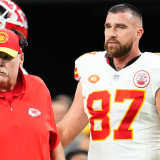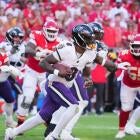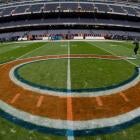Only one explanation makes sense for rash of preseason injuries
People wonder what's causing the epidemic of training-camp injuries that claimed Dennis Pitta, Jeremy Maclin and Dan Koppen over the weekend. The Raiders do, too, and safety Charles Woodson and GM Reggie McKenzie offered the same answer.

NAPA, Calif. -- The first two weeks training camps are supposed to be gravy because nobody loses a game. But tell that to the Philadelphia Eagles. They haven't lost a game, but they just lost their second player in three days to a season-ending knee injury.
And they're not alone.
Over the weekend, Baltimore subtracted tight end Dennis Pitta, and Denver lost center Dan Koppen -- both lost for the year. A week before, Dallas opened the 2013 training camp with defensive lineman Tyrone Crawford tearing his knee ligaments and starting linebacker Anthony Spencer aggravating a bone bruise in his knee -- an injury that requires surgery that will keep him sidelined indefinitely.
So it's beginning to look like The Lost Summer, and unhappy fans want to know why. In fact, a talk-radio host posed that question to me Monday, wondering if it was something teams were or were not doing that makes players vulnerable ... or if it was just one of those things.
My answer: It's just one of those things.
"I'm with you," said Oakland cornerback Charles Woodson. "I think it's a fluky thing."
That works for me. I mean, Jeremy Maclin's setback was a non-contact injury. The same goes for San Diego linebacker Melvin Ingram, who suffered a torn knee ligament in May. I was at San Francisco's practice Sunday when linebacker Darius Fleming collapsed on two-on-one kickoff coverage. Nobody touched him. He just fell as he crossed the 15-yard line, grabbing his left knee while on the ground.
Of course, Fleming's the guy who tore his ACL a year ago, too, then re-injured it in June.
Anyway, file that one under: It happens. That's the only way to explain his and other injuries that make headlines, and here's why: Teams practice less, not more, in training camps today than they did three years ago. They have fewer, not more, contact drills, too. And they have fewer, not more, workouts in pads.
It's not because they choose to; it's because they have to, under terms of the collective bargaining agreement. The point is: Players have more protection now against serious injuries than ever before.
"Maybe guys are working too hard before they come," said Woodson.
Maybe. That's one theory. Another is that muscles, tendons, ligaments, you name it ... body parts ... give way when stressed. Twist them, turn them, stretch them violently or unconventionally, and Jeremy Maclin is what happens. Or Dennis Pitta. Heck, I haven't even talked about Percy Harvin and an injured hip that could keep him out indefinitely.
But others are. And they wonder why the epidemic. So I asked Oakland general manager Reggie McKenzie, and stop if you've heard this before.
"I just think it's a fluke," he said. "What we're doing in the OTAs and offseason and minicamp ... it's not overworking. It's not nearly like it was in the years before. That's when you banged a whole lot more, yet the injuries were not there.
"Maybe it's competition, with some of these players being a little more feisty. There's so much turnover yearly with head coaches and players, maybe players are trying to show something; trying to really impress, and sometimes that leads to (injuries).
"But as far as training and medical differences ... medically, you're doing a whole lot more and better stuff, like better stretching. Plus, I've seen how much better the weight lifting is now, where it's core training and different movement -- a lot of prepping before practice. No, this is better. It's got to be a fluke."
















